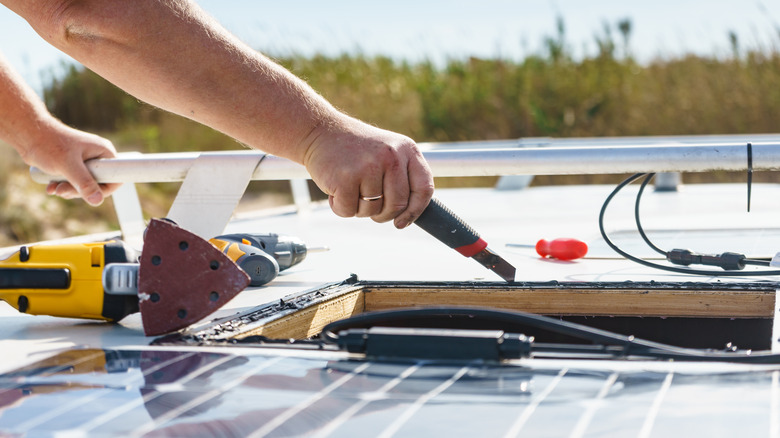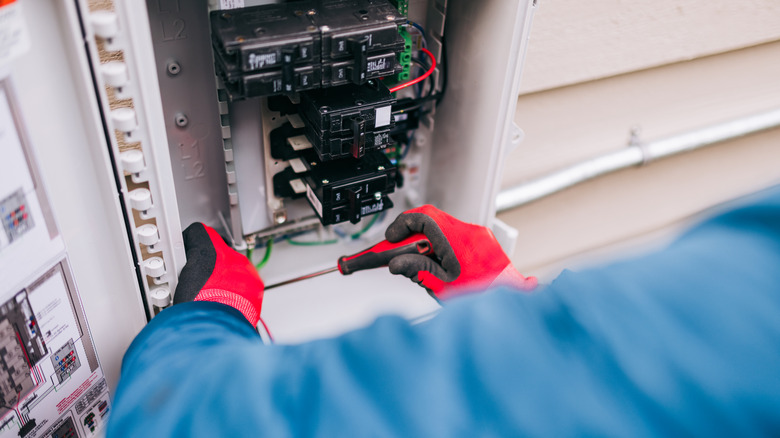The Pros And Cons Of Buying A Solar Panel Kit Instead Of Separate Parts
Those looking to reduce their utility bill or power an off-grid home may consider installing some solar panels. Once you've weighed the pros and cons of installing solar panels and decided to go ahead with the project yourself, one of the next things you'll have to decide is whether you want to purchase a solar panel kit or each component you'll need for the install individually.
A kit should include the solar panels themselves, as well as mounting hardware, wiring, a battery bank for energy storage, and a power inverter. The inverter is a crucial component to any kit, as it converts the direct current (DC) coming from the battery bank into alternating current (AC). As the standard form of electricity used in homes, the AC can then be used to run heating, ventilation, and air conditioning (HVAC) systems, as well as appliances.
Prices of kits vary depending on their size and how much power you're looking to generate. For instance, on the low end, you can find 20W solar panel kits designed to keep the batteries charged in an RV, boat, or trailer, for just over $30. On the higher end, a kit with 64 solar panels, two inverters, and six battery banks designed to power your home can cost around $67,000. Whether buying your own parts is cheaper or more expensive completely depends on the items you choose, and the price of a project will vary widely depending on its size. However, there are several other factors besides price to consider when deciding whether to opt for a solar panel kit.
The advantages of a solar panel kit
A kit is much easier if you're new to solar power systems, as it comes bundled with everything needed to get up and running. If you decide to purchase the items needed for a solar panel install independently, you will have to determine the ratio of solar panels to batteries, as well as how much voltage your power inverters can handle. If you don't feel confident managing those kinds of decisions, a solar panel kit might be worth considering.
With a kit, you also shouldn't have to worry about whether certain components are compatible with others. For instance, there are different types of consumer solar panels, including thin-film, polycrystalline, and monocrystalline solar panels. Not every power inverter is designed to work efficiently with all types of panels, which could lead to a system that doesn't work to its full potential if you don't buy compatible parts separately.
When installing solar panels, you may also need to secure permits. Fortunately, some kits do include the necessary paperwork for said permits, which gives you a head start in terms of completing your system. Without these documents included in the kit, you'll need to go find them yourself online or even by phoning your city or county to determine how to get the paperwork started. Overall, a solar panel kit has the potential to make the job of installing solar panels much easier.
The downsides to a solar panel kit
On the flip side, there are a few disadvantages to a kit that may make it less appealing. One of the biggest issues with solar panel kits is that your choices are limited. While there are a variety of options at different power levels, you may not find a kit which completely meets your needs. Kits aren't going to offer you as much flexibility or customization as you will have constructing your own project independently. Plus, while many kits are designed to be able to scale up with more components for additional power requirements, some don't offer that functionality.
You may also be able to find higher performing components when purchasing separately, which can enhance the effectiveness of your solar panels. For example, a small kit may not include top rated solar panels for RVs and camping trailers, but you can find specific models that do include the features and performance you prefer. While a kit is undoubtably convenient, you may also notice manufacturers skimping on certain items when it comes to quality, which is something you could remedy if purchasing parts separately.


